Welcome all, to what may be the best episode of Vinland Saga all season. A tall claim considering some of the previous episodes, I know. But this little bit has always been one of my favorite sections of story in the entire series, for reasons I hope everyone can see. And for those who can’t? Well allow me to explain.
To me, this episode completes Vinland Saga’s message. Not in that it was lacking before now, it wasn’t. “War and violence bad” is a pretty clear cut and stand alone message that doesn’t need much. Rather I see it as the beginning of Yukimura-Sensei’s response. After all, saying something is bad doesn’t really mean much if you don’t provide an alternative. And what is his alternative? Well taken at face value, as presented by the characters, it would be “Turn the other cheek”. To simply not rise to the words/insults/threats of others. But that’s ignoring a lot of the context surrounding their responses and, I feel, doesn’t wholly do it justice. To truly understand it we need to dive into what this response means for each character, starting with Olmar.
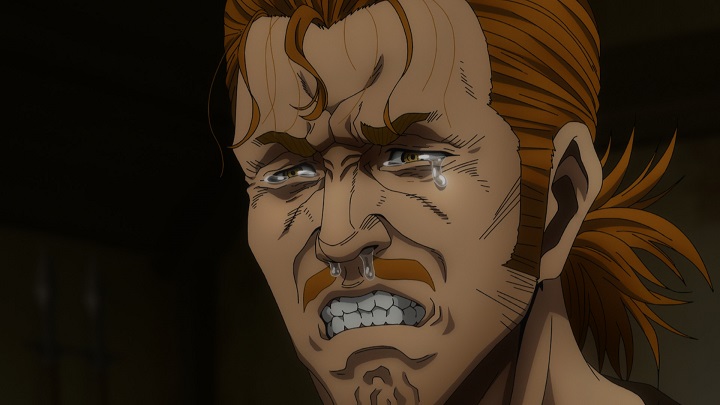
Olmar, to me, is perhaps the most engaging part of the episode. And that is because this is the week that completes him as a character. His arc until now has been one of struggling against his nature. Of wanting to be that Norse warrior, to fit into his culture and make his brother/father proud. But he was never able to do it. And in their eyes, the eyes of his culture, this was generally seen as… pitiful. And in a lot of ways he was. But not for the reasons you would think. It’s not pitiful to want to avoid conflict. To be adverse to bloodshed, to be unwilling to take someone’s life on a whim like Thorgil. What’s pitiful is to feel the need to respond to every word, every comment, every hint of an affront, with violence. With death.
As Olmar so clearly puts it, it is not courage to attack a man for no other reason than his words. To be courageous is to be able to face those words, face reality, accept who you are and what you did, and then learn and move on from it. And we see that as Olmar reflects on his actions up until this point. His acceptance that he was the one who caused all this, that it was his pitiful actions in front of both the King and those warriors, that lead to everyone’s deaths here. And it all it takes to save their lives, to accept and move on from his mistake, is his farm and his pride? Then it’s an easy choice in his eyes.
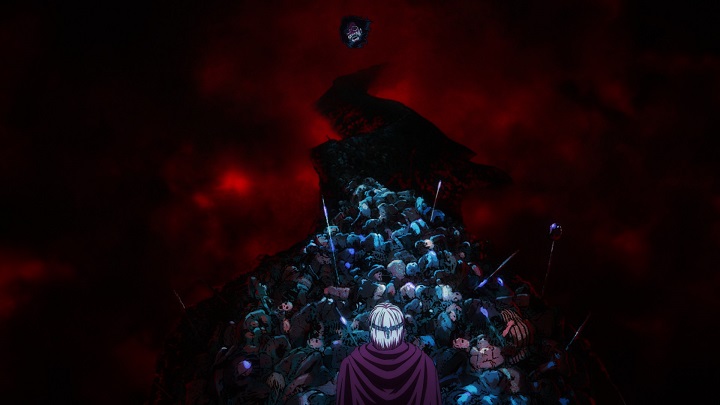
Personally I found this to be beautiful. The amount of growth this young man has gone through across the season, from thinking the world owes him everything based on his name and that he is better then everyone else, to putting other people before himself and standing up to his brother. The way Snake stood at his back, bolstering him and making sure Olmar knew that he wasn’t alone. That he wouldn’t be mocked. Most of all though, I loved Sverkel’s response to this. That Ketil didn’t lose his farm for nothing. That in exchange, Olmar had become a man. The implication being that it was a man Ketil and Sverkel could be proud of. God, I just love how Olmar’s arc across this season has paralleled and fed back into Thorfinn’s so well. Both of them standing against the masculine ideals of the culture and arriving in the same place from opposite directions. Fantastic.
Speaking of Thorfinn, he has his own response this week. Having arrived at the answer long before Olmar, Thorfinn sort of acts like a “Next Step”. Like we are getting to see the entire path both of them have, and will, take in a single episode. He puts into practice Olmar’s realization of not rising to the words of others with how calm and controlled he is around the warriors. Of course to them he appears small and meek, docile like a slave. But Thorfinn doesn’t rise to it. His pride means nothing here, it costs him nothing. And so he continues to roll on, seeking that non-violent answer. And it is here that we see Thorfinn’s sort of first-draft of a solution: The betting game.
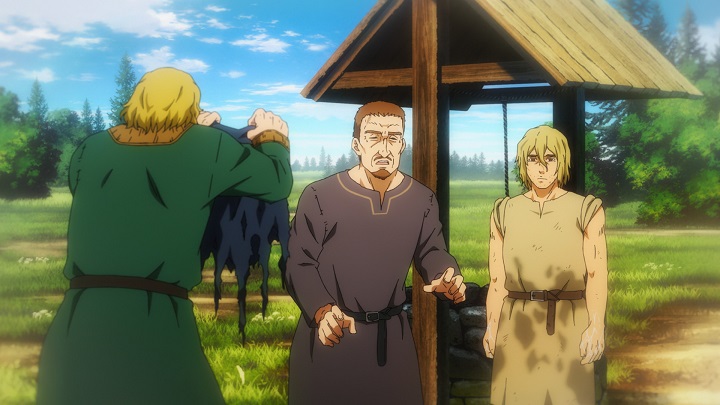
This is just the start of it, and I can’t wait for next episode’s conclusion to really drive it home, but this game is sort of the “first step” on Thorfinn’s non-violent solution plan. Of course he isn’t willing to fight them, that goes against everything he stands for. But to take a few blows in exchange for saving these peoples lives? For stopping the fighting? Well it’s not so dissimilar to Olmar giving up the farm, is it? And this is what I mean by “Turning the other cheek” not being a completely accurate way to present Yukimura’s solution. He doesn’t mean to just meekly accept what the world throws at you. More that there are things more valuable then your possessions, or your pride, or honor. That if taking a few insults, or a punch or two, prevents further conflict then it is courageous to do so. It’s not about accepting the shit the world throws. More about not responding in kind.
So yeah, in case it wasn’t obvious I absolutely loved this episode of Vinland Saga. While not the height of drama for the series, Arnheid and Gardar’s episodes still take that cake, it’s definitely the peak thematically. We finally get some kind of response, some other route worth taking when faced with violence. For the first time Thorfinn is allowed to proactively solve a problem without violence. Meanwhile Olmar gets to grow up and face his brother, the personification of the male ideal of his culture, standing on his own two feet and looking him in the eye while denying everything that he is. It’s all just… So god damn good, and I’m so happy with this adaptation. Hopefully next week will make it even better.

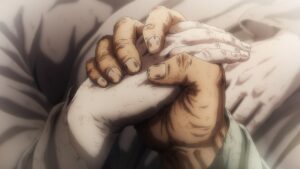
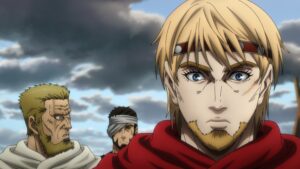
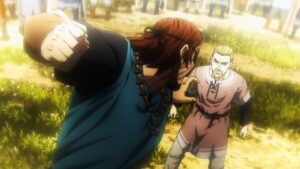
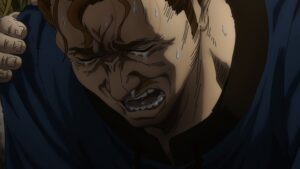
Agreed. Always excited when I remember that another episode has come out. Even if I still find myself wanting Thorfinn to wow everyone with his sweet abilities… Gotta toss that shounen stuff to the wind. Worth it.
For me, the “positive message” of this season is actually one of its weaker parts. To be clear, on a personal level, I think the endorsement of nonviolence works really well. Olmar was an immature asshole who represented all the worst parts of Viking culture, and his journey towards him seeing it (and himself) for what it (he) is – an orgy of pointless destruction (and an arrogant coward), instead of some honorable ideal – is very compelling. And similarly, seeing Thorfinn come to terms with his past, and trying to become a better person, has been fantastic.
But philosophically, this whole ideal of “turning the other cheek”, of steadfast pacifism, seems rather naive and unfeasible to me. Don’t get me wrong: it does work sometimes. Thorfinn can talk to Canute if he takes some (okay, many) hits, and Olmar can save a lot of lives by giving up the farm. But those are clearly special circumstances: Thorfinn can do this because he’s an excellent fighter (if Einar were to try the same, he’d die – plus, Canute would have no reason to listen to him), and it is reasonable for Olmar to do this because the only alternative is unarguably worse – a lot of people would die (himself quite possibly among them), and he’d still lose the farm. But as a general principle? It seems perfectly reasonable to me to respond with violence if people are trying to steal your property without due cause, and you have the ability to defend it.
Take the war in Ukraine as an example. If Ukraine had “turned the other cheek”, as it were, had chosen not resist and to simply give in to Russia’s demands, it would have been a dictatorship with a puppet leader right now, and Russia may well have threatened other countries in Eastern Europe afterwards. Violence sucks, war sucks, and we should avoid both as much as possible – that much is obvious. But in an imperfect world, sometimes they are unfortunately necessary, and it seems rather naive to me to pretend otherwise.
And that brings me to a broader issue I have with how Vinland Saga has framed its philosophical conflict between the ideals of Thorfinn and Canute. Right now, the framing roughly seems to be that Canute has turned into a bit of a villain who espouses evil in his pursuit of good (the road to hell is paved with good intentions and all that), and that Thorfinn is the ideologically pure hero who abhors violence, like any good man should. But that just seems unfair to me. Canute sees a broken system and tries his hardest to fix it; Thorfinn sees a broken system and chooses to run away. The latter may be more ideologically pure, and again, on a personal level it makes a whole lot of sense for Thorfinn to not want to have anything more to do with violence and conflict. But in my view, the former is more admirable in the end. Yes, Canute’s path is a lot less “pure”: if he wants to reform Viking society without dying in like a month, he’ll have to collaborate with evil, will have to work within the Viking value system to some extent, and that means having to condone some very bad things. But if Canute can mitigate some of the worst aspects of Viking culture, he can potentially do a lot of good, while Thorfinn will at best create a small haven of pacifism for a few people (assuming he’ll choose to travel to Vinland, as the show has strongly hinted). And you could also argue that Thorfinn’s path is far more selfish than Canute’s: from what we know about Canute, he probably doesn’t like being king very much, but he still sticks with it for the greater good, while – putting it very uncharitably – Thorfinn chooses to run away from an unjust society so he can live the life he seeks. Again, on a personal level, this works. But as a general ideal for a good life, not so much.
(Oh, and I similarly find Sverkel’s arguments against Ketil’s ambition rather weak, as if he’s at fault for being invaded because he enjoys riches. Sure, you can be happy with a modest life, but poverty isn’t desirable in itself, and wanting a better life for yourself and your family seems perfectly reasonable to me, as long as you don’t hurt anyone in the process. If you can’t seek out a better life without having to fear having everything stolen from you, then that’s first and foremost a failing of the society you live in, not a personal failing. Ketil is a flawed man, but not being happy about being robbed by the king is not a moral failing – though giving in to all his worst impulses in response very much is, of course.)
Don’t get me wrong though, I’m enjoying the farmland saga a lot, and I think it’s pretty much a perfect follow-up to the previous season. If the prologue was an argument for the ugliness of violence and revenge, of trying to seek justice and honor by stabbing things (creating more hate in the process), this season is an argument for the beauty of peace, of creating rather than destroying, and the first cour in particular has been very convincing in that regard. Still, in its most recent episodes it sometimes feels like Vinland Saga overshoots a bit too far in the direction of stubborn pacifism. There’s something admirable about that, of course, and I enjoy Thorfinn’s journey on a personal level, but as an alternative to Viking culture, it doesn’t seem very realistic to me – except perhaps as an ideal to strive for, but that isn’t very helpful when Vikings are raiding your village.
I understand where you’re coming from, but this is meant to be just the beginning of the journey, the first step of the answer. For now its a tad naïve, yes. And it will/has even failed at times. But I think as it goes on you’ll see how this isn’t the final form of the answer. Even on just the viking raiders bit, Vinland Saga asked that same question of whether or not its viable in the face of certain destruction. Of course the initial response is to leave, to sail away and create a new home far away from it all. But obviously it wont be that easy.
I see, I’ll be looking forward to the full answer then! If Vinland Saga ever gets a third season, anyway – otherwise I suppose I’ll just have to catch up with the manga to find out more, once it’s finally complete.